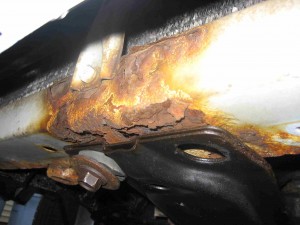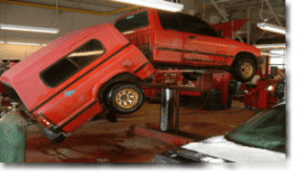Magnesium Chloride is it Bad for Your Car?
Worse than salt, brine sprayed on roads will munch your car to pieces!
Auto mechanics in the salt belt seem to have a pretty good consensus going that the popular deicing chemical magnesium chloride is causing a lot of decay to the rubber and plastic in their customers’ cars. But state Departments of Transportation, when they say anything at all, tend to remind us that magnesium chloride is a salt, and everyone knows that salt just rusts metal. Here’s how J K Perry of Colorado’s Vail Daily puts it:
and plastic in their customers’ cars. But state Departments of Transportation, when they say anything at all, tend to remind us that magnesium chloride is a salt, and everyone knows that salt just rusts metal. Here’s how J K Perry of Colorado’s Vail Daily puts it:
George Brodin, who owns Leadfoot Linda’s Ethics Automotive in Eagle-Vail, said mag chloride is corroding rubber car parts faster than in the past, he said. “We see the windshield wipers lasting half as long as they used to,” he said. “We see all kinds of corrosion underneath the car.”Electrical components, covered in plastic, often corrode and trip check engine lights. Brodin then has to check the electrical system to determine what’s going on. If the plastic wire covers are gone, Brodin sprays a sealer on the wires to prevent further electrical problems. The Colorado Department of Transportation hasn’t found mag chloride corrosive to rubber and plastic, although it can ruin chrome trim, department spokeswoman Nancy Shanks said.
So who should you listen to? Is the magnesium chloride in road salt eating away at the insulation on your vehicle’s electrical wiring or just its chrome trim? Do you have to worry about electrical shorts or just a loss of shininess? One way to attack the problem could be asking who has something to gain from their position on the subject. DOTs obviously want to be able to keep their deicing options open and their costs down, so they would want to discourage public pressure to switch to more expensive alternatives.
But then, mechanics could theoretically also benefit from convincing customers to bring in their cars for wiring safety checks. Fortunately, there is a tie-breaker – a whole industry of them, in fact. Roofers. Roofers have nothing to gain from either side in this debate (except longer-lasting trucks, of course), and their verdict is clear: No professional roofer would ever put magnesium chloride on a roof, because it destroys common roofing materials, including rubber and man-made rubber (plastic). Unfortunately, magnesium chloride as a road deicer isn’t likely to be going away any time soon. But you can protect your vehicle’s wiring, along with its chrome, steel, aluminum, and everything else, with an undercoating from The Rust Stop Pro.
Brine is sprayed on as a liquid. It doesn’t bounce, lands where it’s directed, and is 100 percent effective. Safer for you as a driver, and better for you as a taxpayer.
For your car, however, it’s not better than rock salt. That has to do with something you don’t much think about in the wintertime: humidity.
In most states, brine is a mix of rock salt (sodium chloride) and magnesium chloride, dissolved in water so they can be sprayed on the road. “That’s a very important point because magnesium chloride is much more corrosive than sodium chloride, the rock salt,” said Bob Baboian, an auto industry consultant and a fellow at the National Association of Corrosion Engineers.
Car rust and corrosion are caused by acid created when a salt is dissolved by the moisture in the air. Rock salt remains a crystal until the humidity reaches 70 percent, which doesn’t happen much during the winter. But magnesium chloride dissolves when there is only about 20 to 30 percent humidity. “Which means that your vehicle if magnesium chloride is sprayed on it, is wet constantly,” Baboian said. The acid stays on your car and slowly eats away at the paint and metal.

 Buy US Direct
Buy US Direct Buy CA Direct
Buy CA Direct Buy EU Direct
Buy EU Direct Buy DE Direct
Buy DE Direct